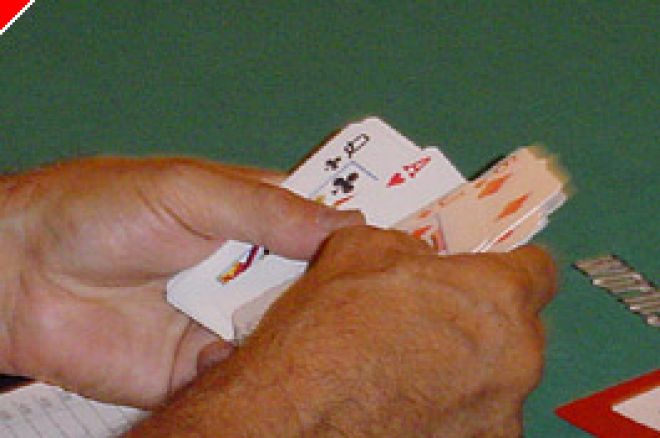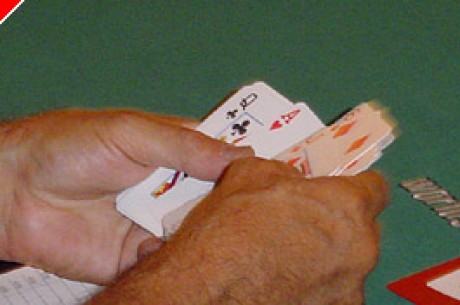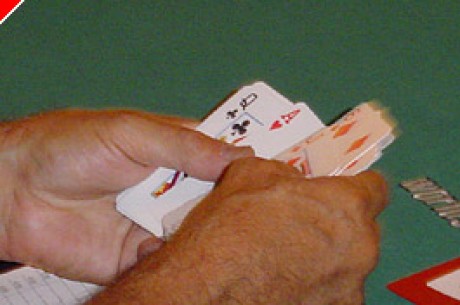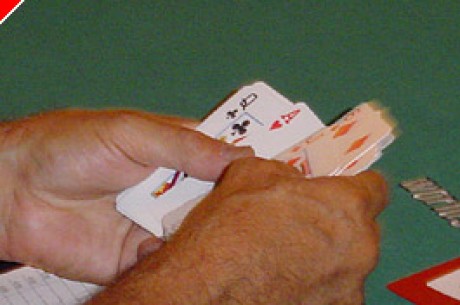Stud Poker Strategy - Stud/8 Sit n Goes, Part Three

Your strategy must change after the first few players are knocked out but before you are clearly in the money. By this point I've found that there are a couple of players on life support and perhaps one or two players with stacks deeper than mine (although sometimes I'm the clear leader). I have to take stack sizes into account on my initial mission to make the money.
That's my mission �C to make the top three. Although the money is relatively short for third with the prize pool generally divided 50/30/20, the difference between third and fourth is infinite percentage-wise. So focus on making the money.
The value of high hands also goes up from what it was initially, since it's more likely now that the field has been reduced to four or five that you'll be heads up with a low draw. You can be slightly more aggressive with your premium pairs, even if they're not split an even if they're lower than Kings. So, for example, I will often raise with a pair against the remaining players. I still must be cautious, but if the situation is right I'll do it. Here are examples of when I can and can't make that play.
I have (Jc9h)Jd. The 3c brings it in and a 4c folds. The action is to me with a Queen remaining to act. I'll raise here, hoping ideally to knock out the two remaining players �C figuring the Queen is unlikely to have two Queens on the deal �C but will re-raise me if he does have them �C in which case I'll fold. And the 3 will be unlikely to play unless he has three low cards with an Ace. The antes and bring-in at this mid-level tend to be substantial, so I'm happy to win without contest. And if I am called by the 3c I like my chances of playing high hand heads up against his likely low �C since if he catches bad he'll likely fold on Fourth to my bet.
On the other hand, I'm not likely to raise if I have the same hand but a (xx)K raises in front of me. I have to fold this hand. Similarly if any other higher card raises me I must fold. So too with the Ace, even though he may be going for low, I can't chance it �C and my expectations aren't that high even if he does have three babes.
I don't want to call even if the higher card just calls a raise but doesn't raise in front of me. So, for example, if a 3 brings it in and a 4 raises and a Q calls, I'm folding. I'm just going for half the pot and don't want to be up against two or three other hands, one of whom may well have me beat on Third.
Also, I have to pay attention to the stack size of my opponents, willing to take more chances and be more aggressive against tiny stacks than against large stacks �C which I generally try to avoid. So while I might raise with my (23)7 with a small stacked Queen and the small stacked bring in 4 remaining, I would only call if I were over stacked by either of them.
By mid point in the tourney I should also have a general idea of how my sit and go opponents play. I can be more aggressive against timid or tight and solid player than against loose or wild opponents. I'd be less likely to raise with my three low cards against a wild player who might re-raise me than against a solid player who isn't going to call without three babes or a pocket pair or three low cards and an Ace. In general, I want to avoid confrontations that are likely to continue until the River with a loose opponent no matter what my opponent catches �C unless I am strongly in the lead on Third Street. I want to raise with at least some expectation that they might concede on Third or on Fourth if I catch good and they catch bad. If my opponent doesn't have the sophistication or discipline to fold, then I have to be much stronger than I would need to be against a sophisticated player who might be manipulated based on the board that I'm showing.
Put another way, when I'm relatively near the money because there are only four or five of us, I am much less willing to play even medium sized advantages for my entire stack �C since if I lose I'm dead. Keep that in mind when you're deciding to raise your opponent. If they're short and can't hurt you that much if they call you down then you can be more inclined to apply pressure with a hand that isn't a great favorite. Similarly so if they're generally tight. But if they're loose and have a large stack, you become more passive until you have a lock on one end of the pot.
Ed note: Ultimate Bet Are having a 25 Aruba seat guaranteed tournament tonight. Sign up, and play - doesn't the beach sound nice?








